Trump's Anti-Green Rollback Team
Air Date: Week of November 22, 2024
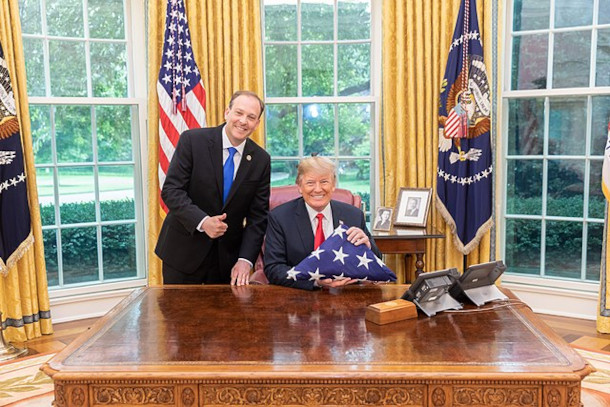
President-elect Donald Trump has pointed to Lee Zeldin, who has supported Trump since his first presidential campaign in 2016, as his choice for head of the Environmental Protection Agency. (Photo: Shaleah Craighead, Wikimedia Commons, Public Domain)
President-elect Trump has nominated three men to run federal departments critical for climate and environmental protection with a mandate to roll back green rules and regulations. Vermont Law Emeritus Professor Pat Parenteau is among the critics of these choices and joins Host Steve Curwood to discuss the nominees, former US Rep. Lee Zeldin for EPA, Liberty Energy CEO Chris Wright for Energy and North Dakota Gov. Doug Burgum for Interior.
Transcript
DOERING: From PRX and the Jennifer and Ted Stanley Studios at the University of Massachusetts, Boston, this is Living on Earth. I’m Jenni Doering.
CURWOOD: And I’m Steve Curwood.
President-elect Trump has unveiled his choices to run three of the federal departments critical for climate and environmental protection. Activists have raised a chorus of concern and criticism. Vermont Law and Graduate School emeritus professor Pat Parenteau is among them, and he joins us now to share why these picks make him worried. Welcome back to Living on Earth, Pat!
PARENTEAU: Hey, Steve, it's good to be with you.
CURWOOD: So Pat. Your credentials include a number of years as regional counsel for the Environmental Protection Agency, and, of course, being a law professor. How are you reacting to President-elect Trump tapping former New York Congressman Lee Zeldin as the next head of the EPA?
PARENTEAU: Well, I guess it's damning with faint praise, but it could have been worse. Frankly, he's not Scott Pruitt. Zeldin does have a record of, for example, supporting strong measures to clean up Long Island Sound, which is another one of the estuaries that are heavily impacted by nutrient pollution and so forth. And he's come out in favor of strong regulation on PFAS and other forever chemicals but, and here's the big but, he's now under the thumb of Trump and the White House with a mandate to deregulate, and you can be sure that whatever you know credentials or praise he might have won before is not going to be his mantra now as EPA Administrator. His job is to begin to roll back all of Biden's climate and environmental policies just the way it worked in Trump 1 where there was over 100 different rules and policies enacted, and I'm sure we're going to see many of the same and probably more so.
CURWOOD: What do you see on the chopping block in terms of rules this time around?
PARENTEAU: Trump has said repeatedly, day one, he's going after the so called tailpipe regulations. These are both fuel economy rules that EPA adopts under the Clean Air Act to deal with a whole variety of pollutants. It's not just climate and carbon and greenhouse gasses. It's lead. It's volatile organic compounds. It's ozone and asthma driving pollutants. So it's, you know, the tailpipe rules are classic pollution control rules that EPA has been using since 1970 since the adoption of the Clean Air Act, which has resulted in meaningful improvements in air all across the country. But there are still many pockets of serious air pollution problems, some of which are interstate problems that only EPA can deal with. So we're going to see, as he says, from day one, targeting these very important pollution control regulations under the Clean Air Act, and right on the heels of that we're going to see them going after the power plant rules and the latest iteration from the Biden administration taking its cue from the Supreme Court's decision in the infamous West Virginia case where it invalidated Obama's Clean Power Plan. EPA said, all right, Supreme Court, if you're telling us we can only require technology improvements at each individual coal plant, then we will do that, and we will use what the industry has been touting as the answer to fossil fuel pollution, which is carbon capture and sequestration. And here's what we'll do. We'll give coal companies ample time to decide whether they want to phase these older coal plants out and replace them with cleaner either gas plants or, of course, ideally, with solar and wind and geothermal and other cleaner sources of energy, will give you a runway of time to 2032 to decide, are you going to continue burning these dirty old coal plants, and if you are going to continue to use them, then you're going to have to install 90% removal of carbon with sequestration. So these two rules alone are the largest regulatory moves to reduce our greenhouse gas emissions. But without these two rules and one other rule dealing with methane emissions from oil and gas industry, without these three big rules, which I'm sure Zeldin is going to go after, we're not going to have at the federal level any meaningful regulation of greenhouse gas emissions from some of the major sources.
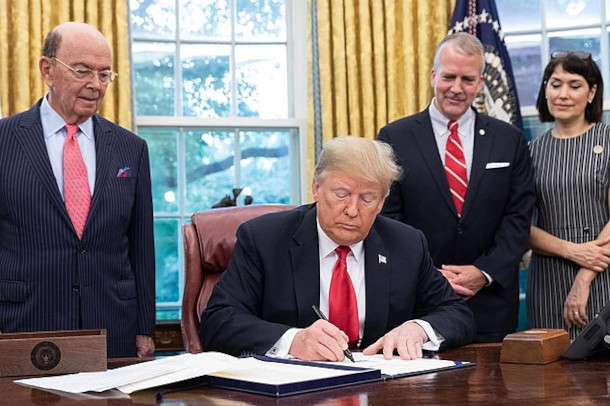
Many of Donald Trump’s rollbacks during his first term as president were successfully challenged in the courts. Trump has already pledged to roll back a number of energy and environmental policies from the Biden administration. (Photo: United States Senate, Wikimedia Common, Public Domain)
CURWOOD: So it takes a while, though, to make a rule, doesn't it Pat, and also to break it, to bust it down. I mean, it seems like I remember when the Obama administration was trying to do their power plant rule, it was like a four year process to get it promulgated. I mean, these are complicated rules. Even if former congressman Zeldin moves at warp speed, how quickly could he get this stuff rolled back?
PARENTEAU: That's going to take years, and if he doesn't learn from the mistakes of Trump 1 and Pruitt and Wheeler, which are the two administrators under Trump 1, if he doesn't learn from their mistakes, which led the courts to reverse them over and over and over again. They lost, Trump 1, over 80% of the legal challenges to their rollbacks, so you might think they'll be smarter this time around, but your point about taking the time necessary to do it right could be a problem for Trump and Zeldin if they really want to show progress on their regulatory rollback agenda. So they're probably going to make mistakes, they're probably going to cut some corners. They're probably going to shortchange some of the procedural requirements under what we call the Administrative Procedure Act. And you can be sure the environmental community, the public health community, they're already gearing up for the battle to come, and they are going to challenge every single one of these moves, and there are still judges on the federal bench. There are a lot of Trump judges, and probably more to come, but there are still a lot of judges out there on the federal bench that are not simply going to roll over and rubber stamp what Zeldin is going to want to do. There are some judges, particularly in the Fifth Circuit, that may be inclined, more inclined toward that direction. But there are a lot of judges who are going to say, no, the law is the law, and if you want to make changes, you're going to have to do it carefully and with due attention to the requirements of law. And so I see many years actually, of litigation and battles we're not going to win them all, those of us that are trying to defend some of these regulations, but I don't think Trump and Zeldin are going to be able to move as fast as they think they're going to be able to go.
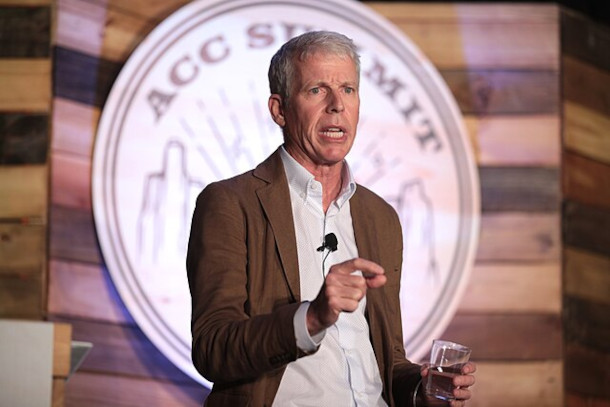
Chris Wright, Donald Trump’s appointee for the Department of Energy, is the CEO of Liberty Energy and is a supporter of natural gas and geothermal energy. (Photo: Gage Skidmore, Wikimedia Commons, CC BY-SA 2.0)
CURWOOD: So President-elect Trump has also selected Chris Wright, who is the CEO of a major fracking firm, Liberty Energy, to be head of the Department of Energy. What do you see coming up for that department with him at the helm?
PARENTEAU: With regard to the DOE secretary, not only does he deny that climate change is a crisis, but he also says we are not in an energy transition. You know, he's denying what the marketplace is showing with regard to solar and wind being, solar in particular, the cheapest forms of electricity generation in the world. He's denying the impact of EVs and electric vehicles on the transportation systems, and the fact that major automakers in the United States and globally are already factoring in plans for ramping up EV production. A lot of that has to do with the inflation Reduction Act and whether some of the incentives for EVs are going to remain in place. That's another topic to discuss. But the point is this Department of Energy Secretary is already said he's going to begin clawing back some of the inflation reduction money that hasn't yet been obligated, and that he is going to accelerate the approval. DOE does have regulatory authority over LNG operations, and he's going to accelerate the licensing of LNG facilities, so instead of a head of the Department of Energy that's seeing the promise and the critical need to scale up renewables and cleaner sources of energy, he wants to take us back to the 1900s, back to the era of coal and oil and gas.
CURWOOD: A lot to unpack here, Pat. President-elect Trump has also picked the governor of North Dakota, Doug Burgum, to head up the Department of Interior, which manages our nation's public lands and waters, and has also been an announcement that he would take hold of a National Energy Council. What do you make of that appointment?
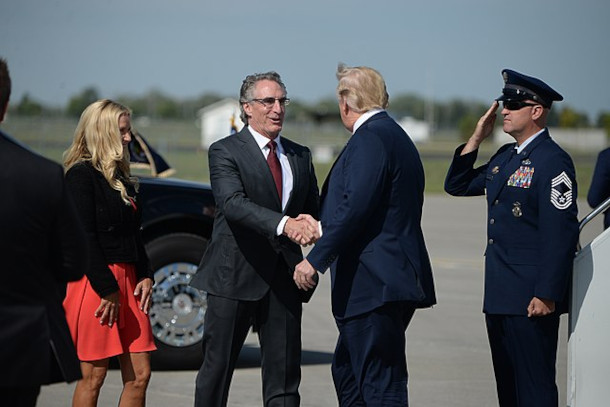
Doug Burgum, current governor of North Dakota and Donald Trump’s pick for the head of the Department of the Interior, is expected to prioritize increasing energy production and output from public lands and waters in the United States, as underscored by his state’s strong ties to the fossil fuel industry. (Photo: Senior Master Sgt. David H Lipp, Wikimedia Commons, Public Domain)
PARENTEAU: Right. I mean, you know, he's stacking the deck with loyalists and also people like Burgum, who has a track record of being able to advance the fossil fuel agenda as governor of North Dakota, a major fossil fuel state, he knows the industry, he knows the business. He doesn't know the Department of Interior that well. He's got a lot to learn. That's a massive department with multiple agencies with conflicting missions. You know, everything from the Fish and Wildlife Service to the Bureau of Land Management to the agency that licenses offshore oil and gas development. But there's no doubt that he's going to try to boost oil and gas leasing on public lands. He understands that part of it, but we have, at this point an excess of surplus energy in the United States, we're a net exporter. In fact, we're the biggest exporter of oil and gas in the world. And he wants to lift the pause that Biden had put on construction of new LNG export terminals just to try to catch up with the environmental impacts of what all this LNG development is doing. So when Burgum tries to say, I'm going to put a lot more oil and gas on the market, including drilling places like the Arctic National Wildlife Refuge or drilling in national monuments, which Trump did the first go around with Bears Ears. You know, Burgum might think that just by offering a lot of leases, he's going to ramp up oil production. It doesn't necessarily follow a lot of this leasing is going to be speculative. There's not really a demand for this. The price of gasoline is going down. Might go back up again. We don't know, it's a global market, but right now it's soft, right? So there's no demand to put a lot more oil and gas under lease than is already under lease, so we'll see how this goes. It is sure to be challenged as well. A lot of the challenges to oil and gas development from Trump 1 were successful because they weren't considering the downstream effects of burning all of this oil and gas we're putting into the market. And the courts were quick to jump on that and say, under the National Environmental Policy Act and other statutes, the Endangered Species Act and others, you have to consider what putting all of this oil and gas into the marketplace is going to do to the climate, and at least think about whether that's a good idea and whether there might be alternative uses of public land for solar and wind and other generation sources. So again, a lot of litigation, a lot of uncertainty, a lot of chaos around oil and gas leasing.
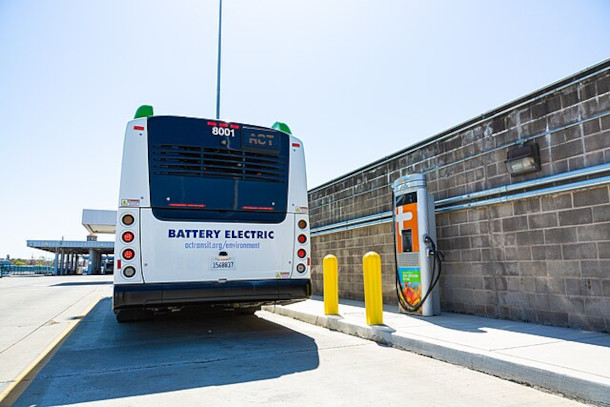
Biden’s electric vehicle (EV) tax credits may face abolition or deep cuts cut under Trump’s administration, despite many motor companies ramping up electric production. (Photo: California Energy Commission, Wikimedia Commons, CC BY 2.0)
CURWOOD: And the market. How do you think the markets are going to respond to this push?
PARENTEAU: I think the markets have gotten worried somewhat about constantly ramping up production. You know, bankers and brokers are smart people. They can read the science and the analysis of stranded assets. They can understand financial risk. They can see the physical risks of climate change. There was a recent analysis at the global level which said that climate change is six times more damaging than some of the original estimates, and is costing the global GDP 12%, this is just the physical damage from climate change. So you know, the smart money people at some level can understand that this simply can't go on and continuing to stoke the market for more and more production and expansion of oil and gas is at some point a dead end. At least we can hope that the financial markets will see it that way.
CURWOOD: Pat Parenteau is an emeritus professor of law from Vermont Law School. Pat, thanks so much for taking the time with us again today,
PARENTEAU: And thank you, Steve, good to be with you.
Links
Inside Climate News | “Lee Zeldin, Trump’s EPA Pick, Brings a Moderate Face to a Radical Game Plan”
ABC News | “Reviewing Trump EPA Admin Nominee Zeldin’s Environmental Record”
E&E News | “Trump’s DOE Pick Cements Fossil Fuel Focus”
The Guardian | “Environmental Groups Alarmed as Doug Burgum Picked for US Interior Secretary”
Living on Earth wants to hear from you!
Living on Earth
62 Calef Highway, Suite 212
Lee, NH 03861
Telephone: 617-287-4121
E-mail: comments@loe.org
Newsletter [Click here]
Donate to Living on Earth!
Living on Earth is an independent media program and relies entirely on contributions from listeners and institutions supporting public service. Please donate now to preserve an independent environmental voice.
NewsletterLiving on Earth offers a weekly delivery of the show's rundown to your mailbox. Sign up for our newsletter today!
 Sailors For The Sea: Be the change you want to sea.
Sailors For The Sea: Be the change you want to sea.
 The Grantham Foundation for the Protection of the Environment: Committed to protecting and improving the health of the global environment.
The Grantham Foundation for the Protection of the Environment: Committed to protecting and improving the health of the global environment.
 Contribute to Living on Earth and receive, as our gift to you, an archival print of one of Mark Seth Lender's extraordinary wildlife photographs. Follow the link to see Mark's current collection of photographs.
Contribute to Living on Earth and receive, as our gift to you, an archival print of one of Mark Seth Lender's extraordinary wildlife photographs. Follow the link to see Mark's current collection of photographs.
 Buy a signed copy of Mark Seth Lender's book Smeagull the Seagull & support Living on Earth
Buy a signed copy of Mark Seth Lender's book Smeagull the Seagull & support Living on Earth

